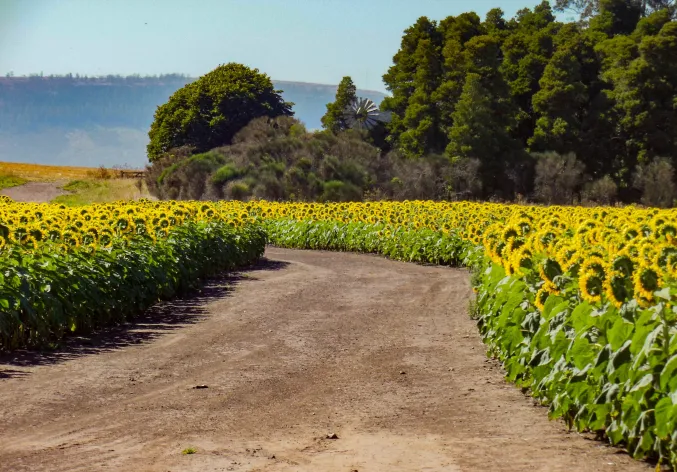Syngenta and The Nature Conservancy Team Up to Deliver Innovation for Nature
- Multi-year collaboration focuses on business practices aimed at improving soil health, resource efficiency and habitat protection in Argentina, Brazil, China, Kenya and the United States
- Syngenta commits to integrate sustainability principles into its core business offerings and research and development pipeline
Basel, Switzerland / Arlington, Virginia, USA, 29 April 2019 - Syngenta and The Nature Conservancy (TNC) today announced a new Innovation for Nature collaboration to promote soil health, resource efficiency and habitat protection in major agricultural regions worldwide. It brings together Syngenta’s research and development capabilities and TNC’s scientific and conservation expertise to scale up sustainable agricultural practices.
Syngenta and TNC have worked together for over a decade on various projects that support sustainable agriculture. This collaboration is intended to demonstrate how a company can reevaluate its business strategy by incorporating sustainability science into its decision-making process and engaging with farmers in new ways. The organizations are exploring investments in new precision agriculture solutions, cover cropping, integrated pest management, biological solutions, remote sensing and analytics, improved seed varieties and other advances. By joining forces, TNC and Syngenta aim to identify and test new innovations and technology that can benefit farmers and the environment at a greater pace and scale than either organization could achieve on its own.
“We are delighted to be furthering our work with The Nature Conservancy – we very much value their expertise in conservation and their collaborative and pragmatic approach to helping farmers to incorporate more sustainable approaches on their farms,” said Erik Fyrwald, Chief Executive Officer at Syngenta. “Through this collaboration, we aim to shape our innovation pipeline for greater environmental benefits and to make a step change in agronomic practices for better soil health, resource efficiency and climate resilience.”
The multi-year collaboration is focused on driving better conservation outcomes through Syngenta’s commercial network and its research and development capabilities – as well as partnering with international organizations, growers and communities. Independent third-party experts will be engaged where appropriate to help assess whether the collaboration is delivering measurable benefit for nature. The Syngenta Foundation for Sustainable Agriculture, with its focus on helping smallholders and improving their farm productivity and access to markets, will also be integral to the collaboration.
“Growing and producing food sustainably is critical as we take on climate change and other global challenges,” said Mark Tercek, Chief Executive Officer at TNC. “To protect nature – and all of us who depend on nature – our food system must do more to prevent deforestation, protect biodiversity and enhance soil health. Our collaboration with Syngenta is a step in the right direction and shows how two organizations with different missions and purposes can work together and look at innovation in a new way.”
Also as part of the collaboration, Syngenta and TNC are now working together to improve resource efficiency, soil health and habitat conservation in the following key agricultural geographies:
- Argentina: In the Chaco region, work will focus on maintaining biodiversity and resilient ecosystems. The project is designed to restore and maintain forest habitat, which aids in regulating nutrient cycling and pests, creates windbreaks against soil erosion, captures carbon, and improves freshwater quality. Through the collaboration, Syngenta and TNC will develop guidelines for suggested best practices and a toolkit for producers.
- Brazil: The collaboration will generate new research on the agronomic and conservation benefits of protected and reforested habitat to research and disseminate the economic benefits of best agricultural practices with a focus on improving land productivity on degraded pastures.
- China: In cooperation with Chinese enterprises and academia, the focus will be on the health and productivity of soil in arid potato-growing regions. The organizations are assessing and testing the environmental and industrial consequences of continuous cropping of potatoes and working to explore a science-based, sustainable crop rotation model for the region.
- Kenya: In Murang’a county, a densely populated region outside Nairobi, the team is working with farmers to implement practices to capture and store rainwater for off-season irrigation, which provides opportunities to increase farm income. It also helps reduce soil erosion, which benefits soil fertility, yields, and water quality. The project also includes soil testing and agronomic training on Integrated Pest Management practices to help farmers maximize benefits from off-season irrigation.
- United States: Working across Syngenta’s network of agricultural product retailers, the collaboration aims to encourage and incentivize the adoption of conservation practices, such as nutrient management, edge-of-field practices and habitat preservation, with an initial focus on agriculture in the Saginaw Bay and Western Lake Erie watersheds.
Earlier this month, Syngenta announced it is accelerating its innovation to address the increasing challenges faced by farmers around the world including climate change, soil erosion and biodiversity loss, as well as changing consumer expectations and views on agricultural technology. Focus areas announced include: society and nature guided innovation, striving for the lowest residues in crops and the environment, and investing where it matters most to farmers and nature. This work – and the collaboration with TNC – will build on Syngenta’s Good Growth Plan, which has six commitments to be achieved by 2020 in areas where improvement is essential to secure the future of agriculture and the planet’s ecosystems.
About Syngenta
Syngenta is one of the world’s leading agriculture companies. Our ambition is to help safely feed the world while taking care of the planet. We aim to improve the sustainability, quality and safety of agriculture with world class science and innovative crop solutions. Our technologies enable millions of farmers around the world to make better use of limited agricultural resources. With 28,000 people in more than 90 countries we are working to transform how crops are grown. Through partnerships, collaboration and The Good Growth Plan we are committed to improving farm productivity, rescuing land from degradation, enhancing biodiversity and revitalizing rural communities. To learn more visit www.syngenta.com and www.goodgrowthplan.com. Follow us on Twitter at www.twitter.com/Syngenta and www.twitter.com/SyngentaUS.
About The Nature Conservancy
The Nature Conservancy is a global conservation organization dedicated to conserving the lands and waters on which all life depends. Guided by science, we create innovative, on-the-ground solutions to our world's toughest challenges so that nature and people can thrive together. We are tackling climate change, conserving lands, waters and oceans at an unprecedented scale, providing food and water sustainably and helping make cities more sustainable. Working in 72 countries, we use a collaborative approach that engages local communities, governments, the private sector, and other partners. To learn more, visit www.nature.org or follow @nature_press on Twitter.
TNC contact information
Ciaran Clayton
Director of Global Media Relations
+1 703-841-4253
ciaran.clayton@tnc.org
Cautionary Statement Regarding Forward-Looking Statements
This document contains forward-looking statements, which can be identified by terminology such as ‘expect’, ‘would’, ‘will’, ‘potential’, ‘plans’, ‘prospects’, ‘estimated’, ‘aiming’, ‘on track’ and similar expressions. Such statements may be subject to risks and uncertainties that could cause the actual results to differ materially from these statements. For Syngenta, such risks and uncertainties include risks relating to legal proceedings, regulatory approvals, new product development, increasing competition, customer credit risk, general economic and market conditions, compliance and remediation, intellectual property rights, implementation of organizational changes, impairment of intangible assets, consumer perceptions of genetically modified crops and organisms or crop protection chemicals, climatic variations, fluctuations in exchange rates and/or commodity prices, single source supply arrangements, political uncertainty, natural disasters, and breaches of data security or other disruptions of information technology. Syngenta assumes no obligation to update forward-looking statements to reflect actual results, changed assumptions or other factors.


